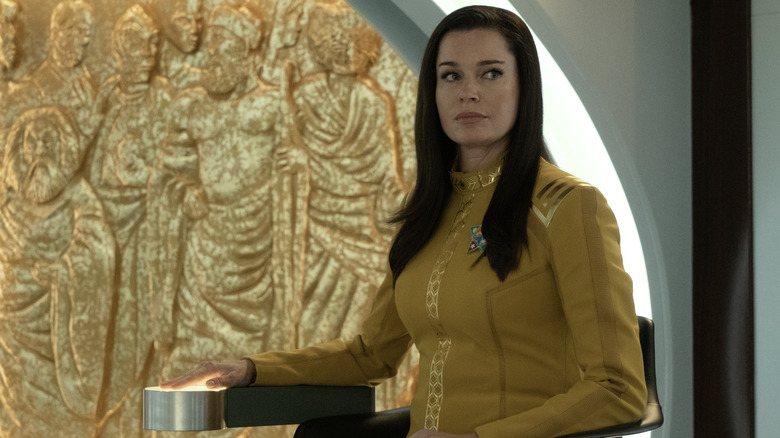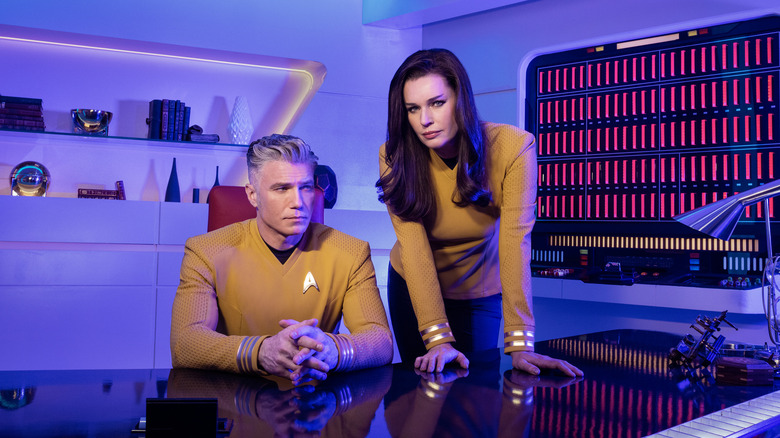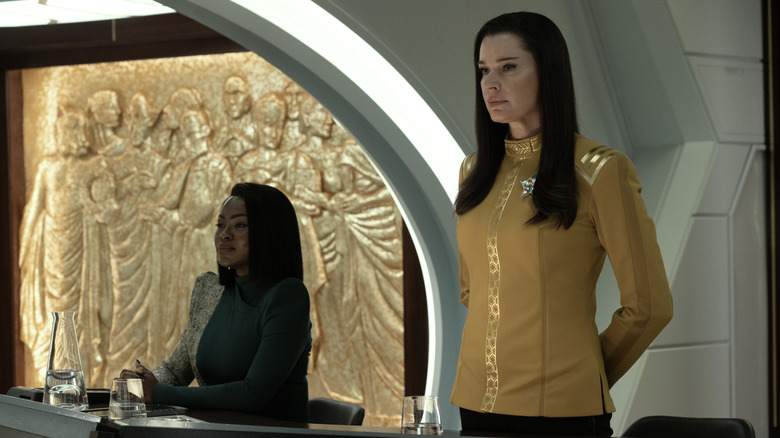Why Illyrians Like Una Are Banned From Starfleet In Star Trek: Strange New Worlds
This article contains spoilers for season 2, episode 2 of "Star Trek: Strange New Worlds."
Season 1 of "Star Trek: Strange New Worlds" ended with the arrest of Commander Una Chin-Riley (Rebecca Romijn), better known as Number One to Captain Christopher Pike (Anson Mount), and the season 2 premiere didn't address her imprisonment. Thankfully, episode 2 of the second season, "Ad Astra Per Aspera," focuses entirely on the trial of the Enterprise's first officer, charged with lying to the Federation about her identity, as she is an Illyrian and any genetically modified being is banned from being in Starfleet. But why are genetically engineered or modified people banned from serving in Starfleet, anyway?
It all goes back to the Eugenics Wars and World War III, events that nearly led to humanity's destruction. More than two centuries before the events of "Strange New Worlds," Earth was overrun with genetically-engineered dictators, the most powerful of whom was Khan Noonien Singh. That name probably sounds familiar to most "Trek" fans, because he's the villain of the original series episode "Space Seed" and the film "Star Trek: The Wrath of Khan," where he's played by Ricardo Montalbán. Khan is the baddest genetically-modified villain of them all, but he's not the only one, and that caused some bad blood with the Federation. You might say that Starfleet doesn't approve of GMOs, if they're sentient, and genetic modification is a big part of Illyrian culture, so Starfleet's not so keen on them. But since Una was genetically enhanced as a child, is it really fair to ban her from Starfleet as an adult?
A bogus ban based in fear
In season 1 of "Star Trek: Strange New Worlds," Una's mysterious past is revealed and her Illyrian heritage is unfortunately discovered by the Federation, but in "Ad Astra Per Aspera," we learn more about her personal history. She and her family could "pass" as human (which is a metaphor too big to get into here), and when people discovered that they were Illyrian, they were discriminated against. People in the Federation simply could not separate their ideas about genetically-enhanced individuals from their hatred of Khan and his kind. Look, just because people are in the fairly progressive Federation doesn't mean they're free of prejudice — even James T. Kirk had his own issues with the Klingons.
Illyrians are a semi-nomadic humanoid species that augment their physiology in order to adapt to the planets they live on; instead of colonizing planets or forcing them to bend to their will, they adjust accordingly. That's honestly pretty commendable, but the Federation's fears over what's happened with augmented individuals in the past means that they're just not willing to bend. In fact, genetically modified people are still banned from serving in Starfleet well into the future. Dr. Julian Bashir (Alexander Siddig) on "Star Trek: Deep Space Nine" also came under investigation because his parents had him augmented as a child, decades after Una's trial.
Una's future in the Federation
During Una's trial, her qualifications as a Starfleet officer are used to help remind those in control of her fate of just how vital she is to the crew of the Enterprise. It takes the combined efforts of Una, Captain Pike, and Una's court defender (Yetide Bedeki) to convince Starfleet that Una is not only so much more than just a genetically-engineered person, she's also never going to be a threat to the thing she loves most. It's important to note that one of Una's closest friends on the Enterprise is La'an Noonien Singh (Christina Chong), who herself is descended from Khan and has dealt with all of the discrimination that comes with her heritage. The Federation may be somewhat enlightened, but unfortunately they still have some work to do when it comes to their holdovers and hang-ups from the 20th and 21st centuries.
How Una's time in Starfleet goes from here onward will be interesting to see. New episodes of "Star Trek: Strange New Worlds" premiere Thursdays on Paramount+.


